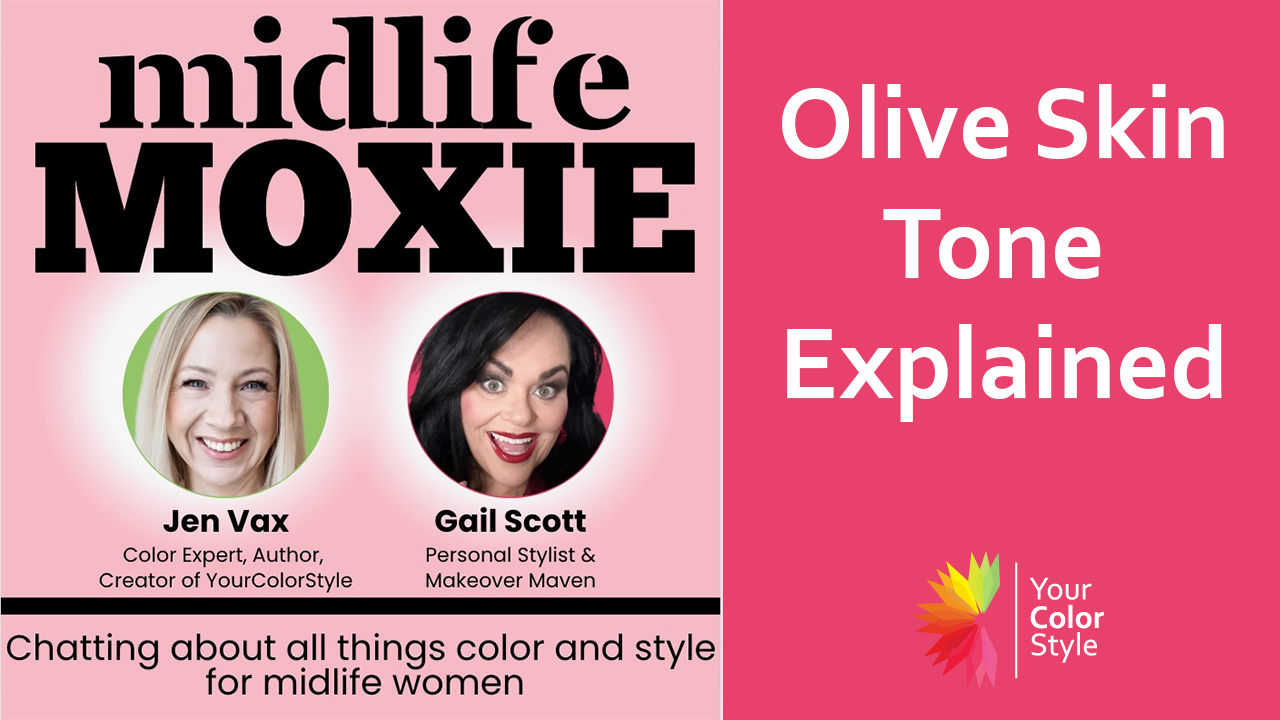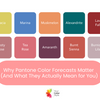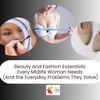Olive Skin Tone Explained: What It Is, How It Shows Up, and the Colors That Truly Flatter You

If you’ve ever felt like you don’t fit neatly into “warm” or “cool,” you’re not alone. In fact, the number one question we get inside Your Color Style is:
“Am I olive… and what do I do with that?”
Olive skin is one of the most misunderstood undertones in color analysis, and until recently, most color systems didn’t account for it at all. That’s why so many women have spent their lives feeling frustrated, confused, and convinced that color just “doesn’t work on them.”
If this is you?
Take a deep breath.
You’re not difficult — you’re different. And you deserve a color palette designed for your unique beauty.
Before we dive deeper, you can watch the full Midlife Moxy episode on olive skin here:
🎥 Watch the Episode: Understanding Olive Skin Tone
What Olive Skin Tone Really Is
Most color systems treat undertones as simple:
-
Warm = yellow-based
-
Cool = blue-based
-
Neutral = a mix of both
But olive?
Olive is not neutral.
It’s its own category entirely.
From a color theory perspective, olive undertones are a mix of:
-
Yellow (warm)
-
Blue (cool)
And those two combine to create a subtle greenish undertone.
This creates a unique situation where:
-
Pink foundations look too pink
-
Yellow ones look too yellow
-
“Neutral” ones still look off
-
And many standard color palettes just don’t feel right
If this is your experience, you’re likely olive—and now it finally makes sense.
How Olive Skin Shows Up in Real Life
Olive isn’t just the classic Mediterranean tan. Olive undertones appear across many ethnicities and show up in a few distinct ways.
1. Light Olive (Green-Gray)
-
Fair skin with muted, ashy, or grayish tones
-
Little to no pink showing
-
Often looks “cool,” but warm colors don’t work either
2. Medium Olive (Golden-Green)
-
Tans easily
-
Looks golden in certain lighting
-
Still no true pink or peach coming through
3. Deep Olive (Rich Green-Gold)
-
Deep complexion with a cool-warm hybrid
-
Often paired with dark hair and dark eyes
-
Looks best in saturated, rich colors
No matter the depth, olive skin rarely shows true pink, which is why soft, muted, dusty shades tend to fall flat.
Why Olive Skin Is So Hard to Analyze in Traditional Systems
Older seasonal systems weren’t built for olive undertones, which leads to:
-
Being typed warm… then feeling awful in mustard
-
Being typed cool… but looking sallow in icy pink
-
Being typed neutral… and still not resonating with the palette
-
Being told your skin “pulls yellow” or “pulls green”
-
Years of frustration with foundation matching
This is why Your Color Style now recognizes Olive as its own category within Step 2 of the process (Warm, Cool, or Olive).
Olive people deserve their own palette.
The Colors Olive Skin Should Avoid
These shades amplify your undertone in the wrong way:
❌ Yellow-Greens
Lime, chartreuse, kelly green
→ Enhances the green in your skin
❌ Golden Yellows & Mustards
→ Can make olive look sallow or “bruised”
❌ Icy Pastels
Icy pink, icy lavender, icy blue
→ Pull out grayness
❌ Soft, Muted, Dusty Tones
Beige, stone, pale taupe
→ Make the skin look flat and tired
If these have always washed you out… now you know why.
The Best Colors for Olive Skin
Despite the colors you eliminate, your power shades are absolute showstoppers. These are colors most people can’t wear well — and you look incredible in them.
✔️ Blue-Greens & Green-Blues
Teal
Deep aqua
Marine blue
Pine
Evergreen
→ Perfect blend of cool + warm, just like you
✔️ Deep Warm Reds
Tomato red
Pimento
Brick red
→ Cuts through green and creates instant radiance
✔️ Vibrant Violets & True Purples
Royal purple
Plum
Violet
→ Opposite green on the color wheel = perfect harmony
✔️ Rich Berries & Deep Pinks
Raspberry
Boysenberry
Magenta-with-depth
→ Adds life and glow without washing you out
✔️ Deep, Saturated Neutrals
Espresso
Charcoal
Chocolate
Black
→ You need neutrals that feel like actual colors
When you wear saturated, richly pigmented colors, your features come alive — your eyes brighten and your skin tone evens out naturally.
Makeup Tips for Olive Skin
Makeup is where olive skin often struggles the most.
Foundation Tips
-
Ignore shade names like “Ivory” or “Beige”
-
Follow undertone letters (C, W, N, O) if provided
-
Avoid overtly yellow or overly pink formulas
-
Some olives do best in neutral foundations, others in olive-specific brands
-
Adjusters or mixers can help fine-tune a match
Eyeshadow
Best colors for most olives:
-
Teal
-
Pine green
-
Eggplant
-
Deep plum
-
Chocolate
-
Navy
Avoid:
-
Silvery-white shimmer
-
Icy pinks
-
Chalky nudes
Blush
You need depth and richness:
-
Berry
-
Plum
-
Terracotta
-
Deep warm red
Avoid:
-
Baby pink
-
Icy rose
-
Bubblegum shades
Lips
Rock these:
-
Brick
-
Cranberry
-
Plum
-
Berry
-
Deep red
Skip these:
-
Nude-beige
-
Light pastel pink
-
Dusty rose
Bold colors will look natural on you — trust the process.
Olives, You Are Not “Difficult.” You Are Distinct.
If you’ve ever felt:
-
“No foundation looks right on me”
-
“Everything washes me out”
-
“Color just doesn’t look good on me”
-
“I don’t fit any category”
You. Are. Not. Alone.
And now you finally have a system designed to support you.
Your Color Style’s Olive Skin Tone Palettes give you:
-
Colors that balance your undertone
-
Saturation that brings your face to life
-
A palette custom-designed for your depth (Light, Medium, or Deep Olive)
This is the moment olives finally get to feel seen.
Ready to Discover Your Olive Palette?
-
Get a Signature Color Analysis (we’ll determine if you’re olive + your depth)
-
Add a Makeup Analysis with Gail for precise foundation, blush, eye, and lip shades
-
Explore the digital Olive Skin Tone palettes, instantly downloadable and automatically updated over time
When you wear the right colors, you don’t just look better — you look like yourself again.











